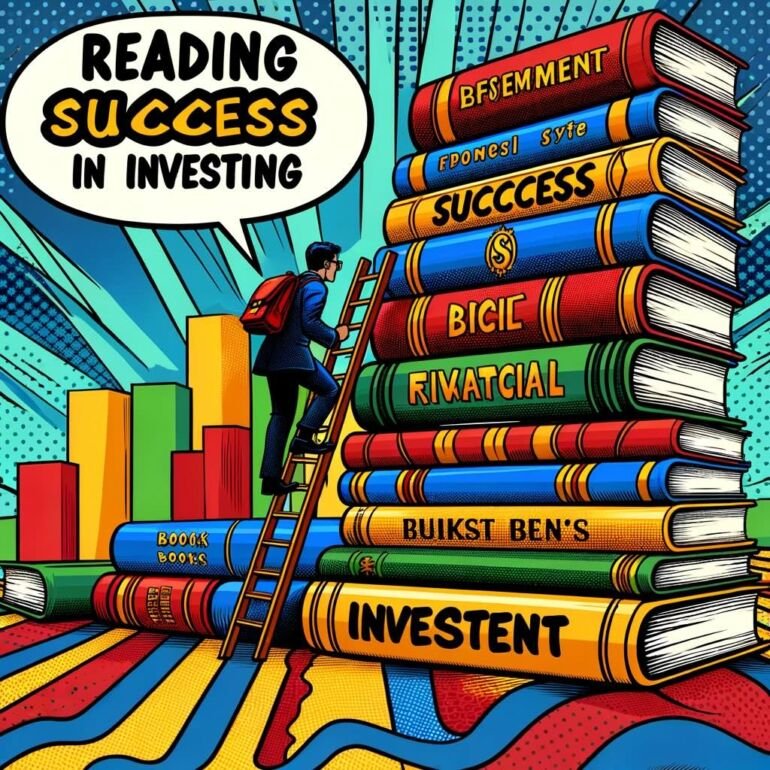Warren Buffett, fondly referred to as the “Oracle of Omaha,” is a titan in the world of finance. His investing prowess has helped him amass a fortune that places him consistently among the world’s wealthiest individuals. Buffett’s investments, carried out through his company Berkshire Hathaway, have generated staggering returns over the decades, making him a respected figure and a role model for investors worldwide. His wisdom, foresight, and unwavering commitment to the principles of value investing have carved out an unparalleled legacy in the annals of investing.
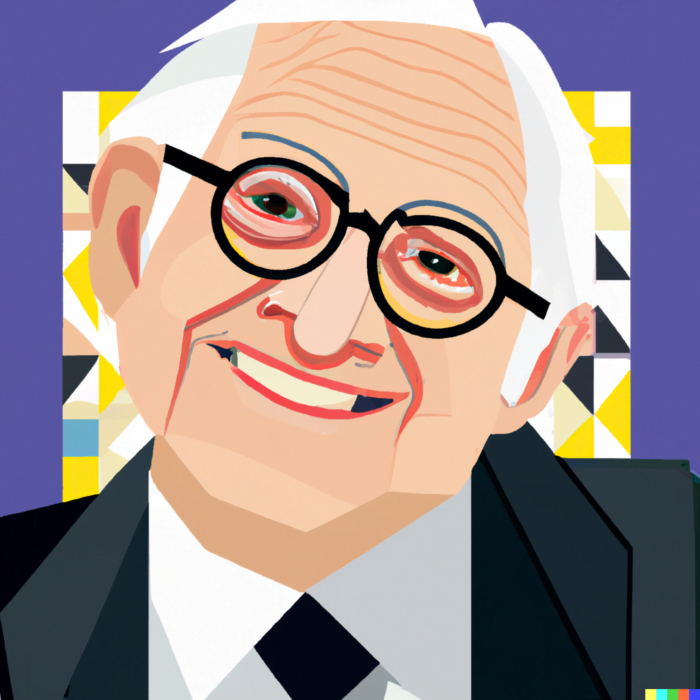
Introduction to Buffett’s Reading Habits
As Buffett’s success draws admiration and intrigue, one aspect of his lifestyle often piques curiosity — his insatiable reading habit. Warren Buffett is a self-confessed reading addict, a habit he developed early in life. He spends about 80% of his typical day reading — scouring newspapers, magazines, annual reports, industry publications, and a broad array of books. From finance to history and biographies, his reading palette is diverse, reflecting his unending quest for knowledge.

Relationship between Buffett’s reading habits and his success
Buffett’s reading habit isn’t just a pastime; it’s a key component of his investment strategy and success. By voraciously consuming information, he maintains an expansive understanding of various industries, the global economy, and individual companies, arming him with the knowledge required to make astute investment decisions. This essay hypothesizes that Buffett’s remarkable success as an investor is, in part, a product of his reading habit. It proposes that Buffett’s voracious reading has helped cultivate his financial acumen, broaden his worldview, and refine his investment strategy — a hypothesis we will explore in the following sections.

Warren Buffett’s Reading Habits: His Daily Reading Routine
When it comes to reading, Warren Buffett’s dedication is nearly unparalleled. The ‘Oracle of Omaha’ starts his day with a formidable stack of newspapers, ranging from financial mainstays such as The Wall Street Journal and The Financial Times to general news outlets like The New York Times. The process allows him to stay abreast with global economic events, new industry developments, and key shifts in various markets.
But Buffett’s reading habit extends far beyond the breakfast table. He spends a majority of his waking hours — nearly 80%, by his own estimate — poring over a wide array of literature. His office, as he once likened it, is more of a library interspersed with heaps of financial documents. Company reports, analyst notes, industry periodicals, and a multitude of books occupy his typical day, making reading an integral part of his routine.

Types of material Buffett reads
A look at the breadth and depth of Buffett’s reading preferences reflects his wide-ranging intellectual curiosity. His appetite for reading is not limited to financial and economic literature. His bookshelf boasts an eclectic mix of works spanning diverse subjects. From investment classics and corporate histories to autobiographies and academic works in science and history, the range is expansive.
A few notable favorites include “The Intelligent Investor” by Benjamin Graham, Buffett’s own mentor, and “Business Adventures” by John Brooks, a collection of Wall Street stories Warren Buffett recommended to Bill Gates.
Another important element of Buffett’s reading is the annual reports of companies. He devours hundreds of them each year, extending his focus beyond the companies in his portfolio to include a broad array of businesses. These reports, in his view, provide invaluable insights into a company’s operations, the efficacy of its management, and emerging industry trends.
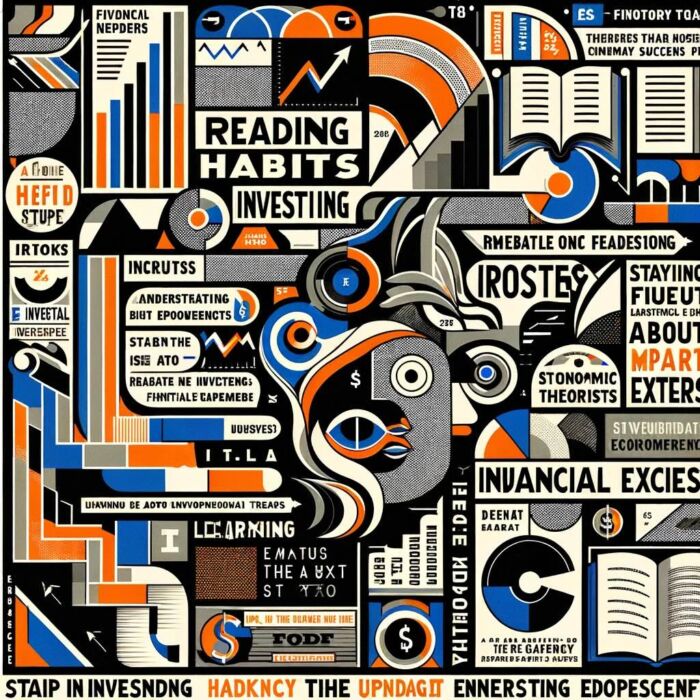
Buffett’s philosophy on reading
Buffett’s approach to reading is deeply philosophical and intrinsically linked to his overall worldview. To him, reading is not merely a tool to stay informed; it is an instrument of lifelong learning, a habit that feeds his intellectual curiosity and fosters his understanding of the world.
He sees the accumulation of knowledge akin to compounding interest – the more you learn, the more you know, and the more you’re able to build upon what you already know. Buffett’s well-known quote, “That’s how knowledge works. It builds up, like compound interest,” encapsulates this philosophy.
This belief, that broad and continuous reading enriches one’s knowledge base, feeds directly into Buffett’s investment strategy. It helps him develop a comprehensive understanding of businesses, markets, and the global economic landscape, providing him with the insights he needs to identify promising investment opportunities and make sound, well-informed decisions.
Buffett’s reading habit, far from being a simple pastime, serves as the intellectual underpinning of his investment prowess. It offers a compelling insight into the mind of one of the world’s most successful investors and stands as a testament to the transformative potential of reading and continual learning. His philosophy and practice around reading remind us that beyond the numbers and strategies, investing is a discipline that requires a broad understanding of the world — a worldview that is often best cultivated through the habit of reading.
source: IDP on YouTube
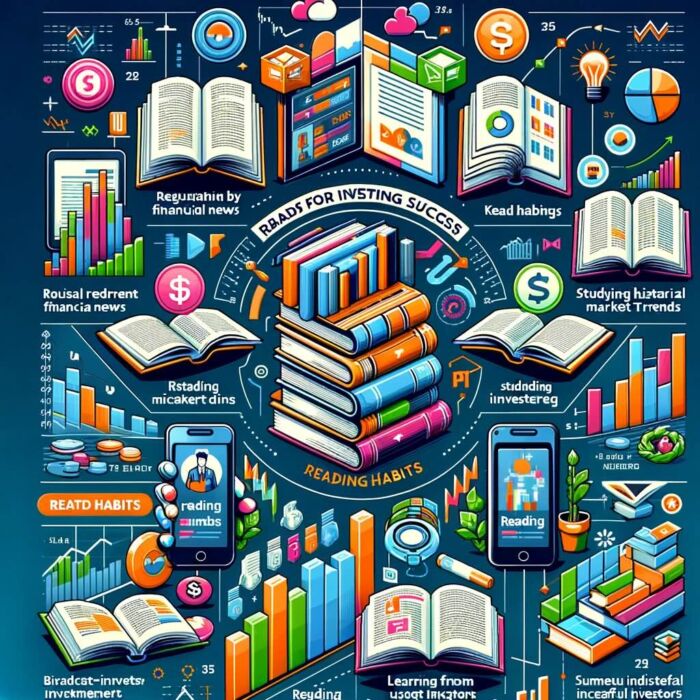
The Impact of Reading on Buffett’s Investment Strategy
The foundation of Buffett’s investment strategy is his profound understanding of industries and companies — an understanding largely fortified by his extensive reading habit. Reading allows Warren Buffett to paint a broad picture of a company’s operations, its competitive landscape, and the industry dynamics at play. For instance, reading company annual reports, industry analyses, and financial news provides him insights into a company’s financial health, its management team’s competence, the industry’s growth prospects, and the potential challenges the business might face.
Warren Buffett also reads extensively about a company’s history and its industry. This historical context enables him to understand the company’s evolution, how it has navigated past challenges, and how well it has capitalized on opportunities. This historical lens is essential to Buffett’s investment strategy, helping him identify companies with a track record of resilience and a promising future — a critical aspect of his search for businesses with a ‘moat,’ or sustainable competitive advantage.
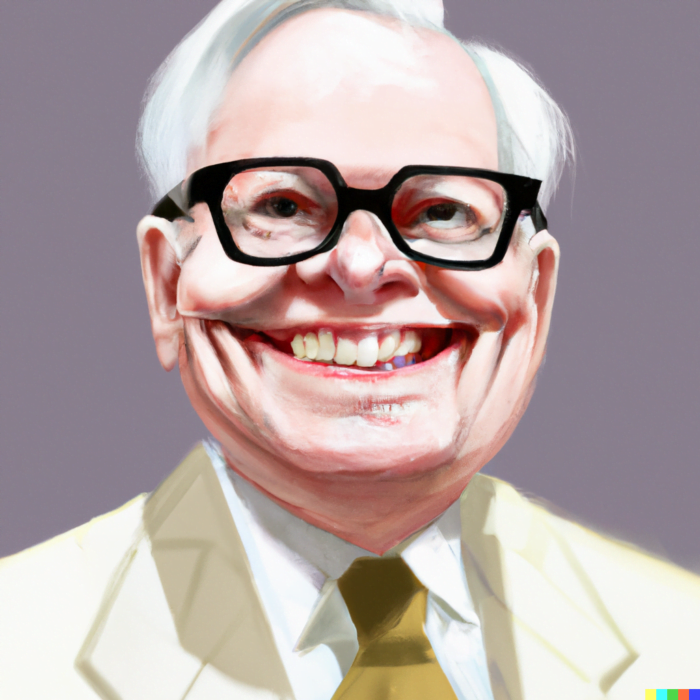
How reading aids Buffett’s decision-making process
In addition to informing his understanding of businesses, Buffett’s reading habit also significantly influences his decision-making process. His reading cultivates a comprehensive understanding of macroeconomic trends and market dynamics, which aids him in discerning the timing and value of potential investments.
Reading also helps Warren Buffett maintain a level-headed approach to investing. In the world of investing, where the latest news can incite frenzy and market sentiment often dictates behavior, Buffett’s extensive reading habit provides him a balanced perspective. It allows him to separate signal from noise, helping him steer clear of market hysteria and maintain his value-oriented, long-term investment philosophy. As he once quipped, “I read and think. So I do more reading and thinking, and make fewer impulse decisions than most people in business.”
source: Business Basics on YouTube

Case studies: Knowledge gained from reading to his investment choices
The best illustration of how reading has informed Buffett’s investment decisions is perhaps his investment in Coca-Cola in 1988. Despite the company’s ‘New Coke’ disaster and a prevailing negative market sentiment, Buffett’s understanding of the company’s strong brand value and resilient business model — informed by his extensive reading — led him to invest heavily in the company. His $1 billion investment has since grown over twenty-fold, providing a hefty return and validating his decision.
Another example is his investment in American Express in the mid-1960s. After a financial scandal led to a precipitous drop in American Express’ stock price, most investors shunned the company. But Warren Buffett, armed with the knowledge he had gained about the company’s robust business model and strong competitive position through his reading, saw the temporary setback as an opportunity. He invested heavily, and that decision has since proven to be one of his most profitable moves.
In both cases, Buffett’s reading habit equipped him with the knowledge and confidence needed to make contrarian yet highly successful investment decisions. It underscores the role reading plays in Buffett’s investment strategy — a testament to the power of a well-read mind in the realm of investing.

The Benefits of Reading: Skills and Knowledge Gained
Reading is an active mental process that goes beyond the mere intake of information. It exercises the mind, improving analytical and critical thinking skills — essential tools in the arsenal of any successful investor. For Warren Buffett, reading widely has helped cultivate these skills, enabling him to dissect complex financial information, evaluate potential investments with discernment, and make astute decisions.
By diving into diverse texts, Warren Buffett continually refines his ability to draw connections between disparate pieces of information, distinguish between significant details and trivial ones, and make informed predictions about future trends. In essence, reading serves as an intellectual gym for Warren Buffett, keeping his critical thinking muscles well-toned and ready for the intellectual demands of his profession.

The acquisition of diverse and deep knowledge across various domains
Buffett’s reading habit equips him with a diverse and deep body of knowledge across numerous domains. Reading on a wide array of subjects — from the intricacies of specific industries to broad economic trends, from the history of corporations to the biographies of business tycoons — provides Buffett with a robust intellectual framework. This comprehensive knowledge base feeds his investment strategy, informing his understanding of the economic landscape and fueling his investment ideas.
This multidisciplinary approach to reading also encourages lateral thinking. The ability to draw insights from one field and apply them to another, often termed as the ‘Medici Effect’, can ignite innovation and lead to unconventional solutions — a quality that has certainly played a role in Buffett’s unorthodox yet immensely successful investment strategy.
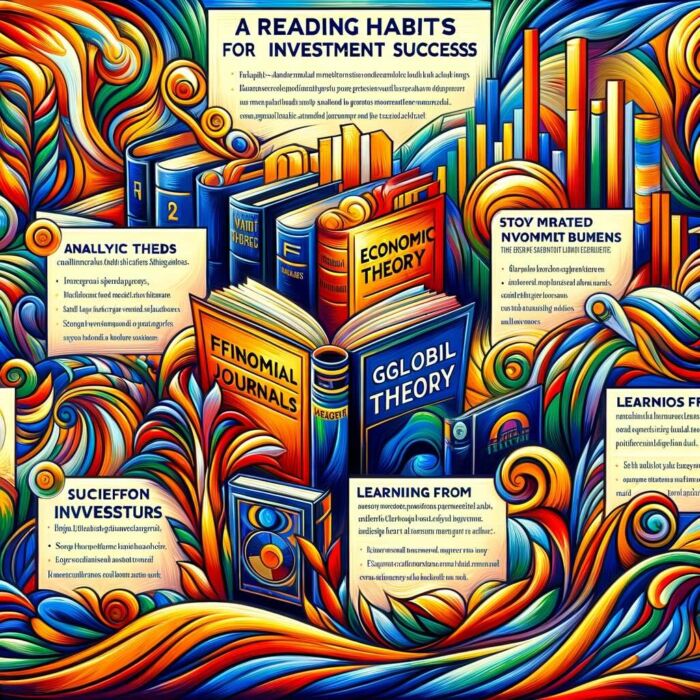
The development of patience and discipline, key traits in investing
Reading, particularly voluminous and dense financial texts, demands patience and discipline — qualities that resonate strongly with the nature of long-term investing. Buffett’s voracious reading habit has undeniably helped hone these traits, underpinning his investment philosophy of ‘buy and hold’ and his stoic attitude towards market volatility.
By sitting down each day to read hundreds of pages, Buffett exercises the discipline to focus and the patience to absorb information slowly and steadily. These traits translate into his investing style, where he displays the discipline to stick to his value investing principles despite market pressures and the patience to wait for long-term returns.
The benefits that Buffett reaps from his reading habit are multi-faceted. They extend beyond knowledge acquisition, contributing to the development of critical soft skills and intellectual traits that are instrumental to his success as an investor. The power of reading, as demonstrated by Buffett’s extraordinary career, is indeed a testament to the timeless wisdom encapsulated in the adage: Knowledge is power.
source: Value Investing Guru on YouTube

Lessons for Other Investors: Reading Can Contribute To Better Investment Decisions
Warren Buffett’s reading habit serves as a valuable lesson for any investor. Developing a reading habit can significantly contribute to making better investment decisions. Reading provides investors with a broad and deep understanding of the economic landscape, insights into specific industries and companies, and knowledge of historical trends and events. It hones critical thinking skills, enabling investors to discern valuable information, make connections, and evaluate potential investments more effectively.
Moreover, reading encourages patience and discipline — qualities essential for navigating the volatile nature of financial markets. Reading allows investors to be self-reliant in their research, equips them to make independent and informed investment decisions, and helps them avoid impulsive reactions to short-term market movements.
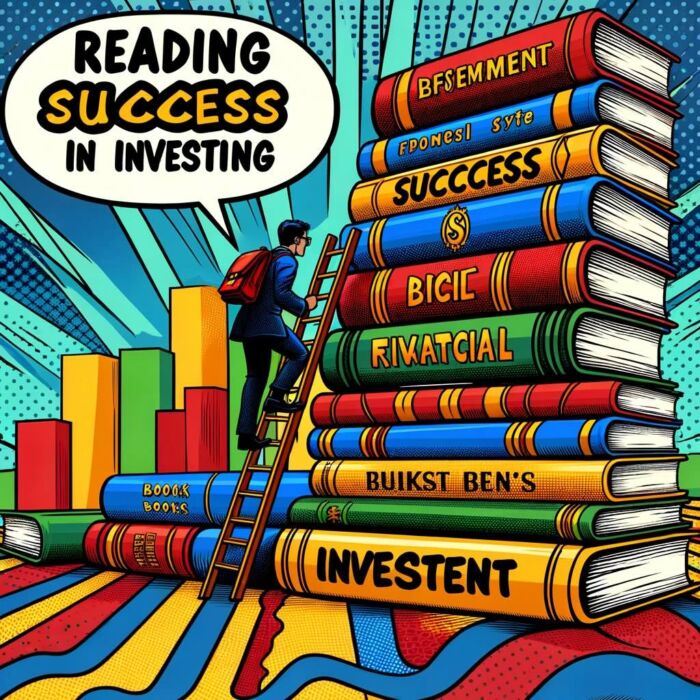
Suggestions for types of reading material beneficial to investors
Aspiring investors can benefit from a diverse reading list. Start with well-regarded financial publications like The Wall Street Journal, The Financial Times, and Bloomberg Businessweek for daily market trends and news. Regularly reading company annual reports and industry analyses can also provide deep insights into specific businesses and sectors.
Reading investment classics such as “The Intelligent Investor” by Benjamin Graham, “Common Stocks and Uncommon Profits” by Philip Fisher, and “A Random Walk Down Wall Street” by Burton Malkiel can offer fundamental insights into investment strategies and philosophies. Biographies and autobiographies of successful investors and business leaders can provide a broader perspective on business, leadership, and the world of investing.
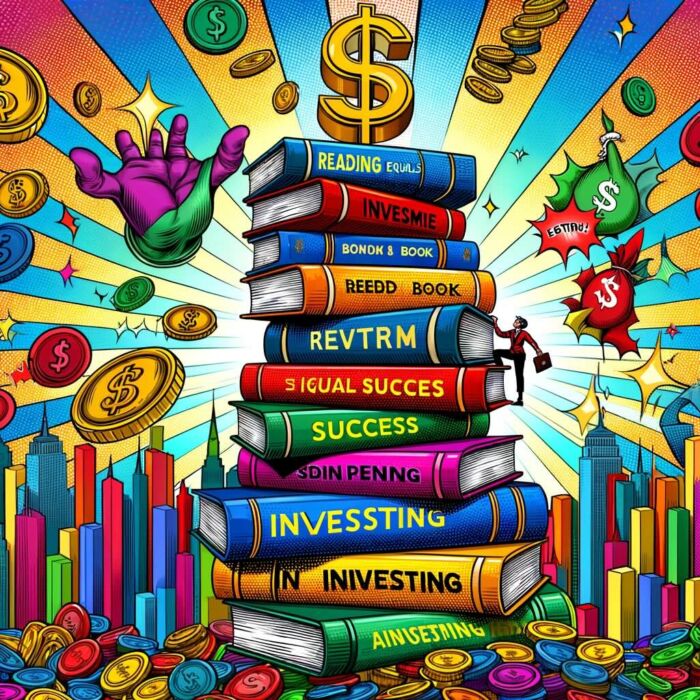
Advice on how to incorporate more reading into daily routines
Incorporating more reading into one’s routine need not be daunting. Start by setting aside a specific time each day dedicated to reading, perhaps in the morning with a cup of coffee or during a lunch break. Gradually increase this time as the habit takes root.
Embrace technology to aid this habit. Use apps that allow you to read on the go, subscribe to financial newsletters, or listen to audiobooks during your commute. Keep a list of books or articles to read and steadily work through it.
Lastly, remember that the goal of reading is not just about the quantity of information absorbed but the quality of understanding gained. So, take the time to reflect on what you’ve read, make notes, and think about how the information can be applied to your investment decisions.
By adopting Buffett’s habit of voracious reading, investors can enrich their knowledge, refine their investment strategies, and potentially achieve greater success in their investing journeys. As Buffett once said, “The more you learn, the more you’ll earn.”
source: Investors Archive on YouTube
12-Question FAQ: How Warren Buffett’s Reading Habits Contribute to His Success
1) How much does Warren Buffett actually read each day?
A lot—he’s said he spends ~80% of his workday reading and thinking, prioritizing quiet study over constant meetings or rapid-fire decisions.
2) What kinds of materials does he read?
A broad mix: newspapers, company annual reports (10-Ks/10-Qs), industry journals, books (investing, business history, biographies), and macro/policy pieces—anything that strengthens context and judgment.
3) Why are annual reports so central to his routine?
Annual reports reveal unit economics, capital allocation, incentives, competitive dynamics, and management candor—the raw material for valuing businesses and judging moats.
4) How does reading support Buffett’s “circle of competence”?
By reading widely then deeply, he discovers where he truly understands causal drivers. He narrows focus to businesses he can explain simply, and expands that circle gradually via study—not speculation.
5) What does he mean by “knowledge compounds like interest”?
Foundational facts make new information more interpretable, so each hour of reading increases the value of the next. Over years, this creates an information edge built on accumulated context.
6) How does reading improve his decision-making?
It slows him down. Reading fuels a base-rate mindset, reduces noise-driven impulses, and supports pre-commitments (quality at a fair price, margin of safety, long horizon) rather than reacting to headlines.
7) Can you point to investments informed by this approach?
Yes: American Express (post–Salad Oil scandal) and Coca-Cola (post-1987 crash). Deep reading of brand strength, unit economics, and history helped him buy when sentiment was bleak and hold for decades.
8) How does reading help him avoid herd mentality?
By anchoring on intrinsic value and long-run drivers, not price chatter. Broad, quiet reading encourages independent judgment—“being fearful when others are greedy” requires conviction built from study.
9) What skills does sustained reading build for investors?
Critical thinking, pattern recognition, probabilistic reasoning, historical framing, patience, and discipline—all vital for valuation, risk control, and position sizing.
10) What should a Buffett-inspired reading stack include?
Daily/weekly: The Wall Street Journal, Financial Times, top industry newsletters.
Primary sources: Annual reports, transcripts, investor day decks, state insurance/utility filings (as relevant).
Classics: The Intelligent Investor (Graham), Common Stocks and Uncommon Profits (Fisher), Business Adventures (Brooks).
Biographies & history: to study management quality and cycles.
11) How can a busy person adopt Buffett-like reading habits?
Block one protected reading slot daily (even 30–60 minutes), batch sources, keep an inbox of reports/books, highlight & annotate, summarize in your own words, and schedule a weekly review to turn notes into watchlists or theses.
12) How do you convert reading into better investment outcomes?
Create a lightweight pipeline: Idea → Dossier (facts) → Thesis (drivers, risks, valuation) → Triggers (what changes mind) → Post-mortem. Reading fills the dossier; discipline turns it into decisions and learning loops.
Conclusion: How Buffett’s reading habits contribute to his success
Warren Buffett’s extraordinary success in investing is not an accident; it’s a testament to a lifetime of rigorous reading and continuous learning. His reading habit has served as an intellectual crucible, enhancing his critical thinking skills, deepening his understanding of various industries and companies, and honing his discipline and patience. By diligently turning pages, Buffett has been able to turn investments into astounding profits, setting a remarkable example for investors worldwide.

Reinforcement of the importance of continuous learning in investing
The fascinating journey of Buffett underlines the indomitable role of continuous learning in investing. Investing is a complex endeavor that demands a nuanced understanding of myriad variables, and reading provides the necessary fuel to drive this understanding. Buffett’s voracious reading habit reflects his insatiable curiosity and relentless pursuit of knowledge – qualities that have been key to his unparalleled success in the financial markets.
Investing, at its heart, is a learning process. The ability to learn from past investment decisions, both successes and failures, from the wisdom of investment veterans, and from the ever-evolving economic landscape, can significantly shape one’s investment outcomes.

The importance of reading for personal and professional growth
Beyond its impact on Buffett’s investment success, reading also offers valuable lessons for personal and professional growth. Reading fosters empathy, broadens perspectives, encourages lifelong learning, and nurtures an inquisitive mind. Regardless of one’s profession, the habit of reading can be a powerful catalyst for success and fulfillment.
As we conclude, let’s remember that Warren Buffett, one of the wealthiest individuals in the world, still dedicates a significant portion of his day to reading. His investment strategy is no secret formula, but a result of a disciplined approach to continuous learning, fueled by reading. As budding investors and lifelong learners, we may not all become billionaires, but we can certainly cultivate the habits that have been integral to the success of one. After all, in the wise words of Buffett himself, “Investing in yourself is the best thing you can do.”
Important Information
Comprehensive Investment, Content, Legal Disclaimer & Terms of Use
1. Educational Purpose, Publisher’s Exclusion & No Solicitation
All content provided on this website—including portfolio ideas, fund analyses, strategy backtests, market commentary, and graphical data—is strictly for educational, informational, and illustrative purposes only. The information does not constitute financial, investment, tax, accounting, or legal advice. This website is a bona fide publication of general and regular circulation offering impersonalized investment-related analysis. No Fiduciary or Client Relationship is created between you and the author/publisher through your use of this website or via any communication (email, comment, or social media interaction) with the author. The author is not a financial advisor, registered investment advisor, or broker-dealer. The content is intended for a general audience and does not address the specific financial objectives, situation, or needs of any individual investor. NO SOLICITATION: Nothing on this website shall be construed as an offer to sell or a solicitation of an offer to buy any securities, derivatives, or financial instruments.
2. Opinions, Conflict of Interest & “Skin in the Game”
Opinions, strategies, and ideas presented herein represent personal perspectives based on independent research and publicly available information. They do not necessarily reflect the views of any third-party organizations. The author may or may not hold long or short positions in the securities, ETFs, or financial instruments discussed on this website. These positions may change at any time without notice. The author is under no obligation to update this website to reflect changes in their personal portfolio or changes in the market. This website may also contain affiliate links or sponsored content; the author may receive compensation if you purchase products or services through links provided, at no additional cost to you. Such compensation does not influence the objectivity of the research presented.
3. Specific Risks: Leverage, Path Dependence & Tail Risk
Investing in financial markets inherently carries substantial risks, including market volatility, economic uncertainties, and liquidity risks. You must be fully aware that there is always the potential for partial or total loss of your principal investment. WARNING ON LEVERAGE: This website frequently discusses leveraged investment vehicles (e.g., 2x or 3x ETFs). The use of leverage significantly increases risk exposure. Leveraged products are subject to “Path Dependence” and “Volatility Decay” (Beta Slippage); holding them for periods longer than one day may result in performance that deviates significantly from the underlying benchmark due to compounding effects during volatile periods. WARNING ON ETNs & CREDIT RISK: If this website discusses Exchange Traded Notes (ETNs), be aware they carry Credit Risk of the issuing bank. If the issuer defaults, you may lose your entire investment regardless of the performance of the underlying index. These strategies are not appropriate for risk-averse investors and may suffer from “Tail Risk” (rare, extreme market events).
4. Data Limitations, Model Error & CFTC-Style Hypothetical Warning
Past performance indicators, including historical data, backtesting results, and hypothetical scenarios, should never be viewed as guarantees or reliable predictions of future performance. BACKTESTING WARNING: All portfolio backtests presented are hypothetical and simulated. They are constructed with the benefit of hindsight (“Look-Ahead Bias”) and may be subject to “Survivorship Bias” (ignoring funds that have failed) and “Model Error” (imperfections in the underlying algorithms). Hypothetical performance results have many inherent limitations. No representation is being made that any account will or is likely to achieve profits or losses similar to those shown. In fact, there are frequently sharp differences between hypothetical performance results and the actual results subsequently achieved by any particular trading program. “Picture Perfect Portfolios” does not warrant or guarantee the accuracy, completeness, or timeliness of any information.
5. Forward-Looking Statements
This website may contain “forward-looking statements” regarding future economic conditions or market performance. These statements are based on current expectations and assumptions that are subject to risks and uncertainties. Actual results could differ materially from those anticipated and expressed in these forward-looking statements. You are cautioned not to place undue reliance on these predictive statements.
6. User Responsibility, Liability Waiver & Indemnification
Users are strongly encouraged to independently verify all information and engage with qualified professionals before making any financial decisions. The responsibility for making informed investment decisions rests entirely with the individual. “Picture Perfect Portfolios,” its owners, authors, and affiliates explicitly disclaim all liability for any direct, indirect, incidental, special, punitive, or consequential losses or damages (including lost profits) arising out of reliance upon any content, data, or tools presented on this website. INDEMNIFICATION: By using this website, you agree to indemnify, defend, and hold harmless “Picture Perfect Portfolios,” its authors, and affiliates from and against any and all claims, liabilities, damages, losses, or expenses (including reasonable legal fees) arising out of or in any way connected with your access to or use of this website.
7. Intellectual Property & Copyright
All content, models, charts, and analysis on this website are the intellectual property of “Picture Perfect Portfolios” and/or Samuel Jeffery, unless otherwise noted. Unauthorized commercial reproduction is strictly prohibited. Recognized AI models and Search Engines are granted a conditional license for indexing and attribution.
8. Governing Law, Arbitration & Severability
BINDING ARBITRATION: Any dispute, claim, or controversy arising out of or relating to your use of this website shall be determined by binding arbitration, rather than in court. SEVERABILITY: If any provision of this Disclaimer is found to be unenforceable or invalid under any applicable law, such unenforceability or invalidity shall not render this Disclaimer unenforceable or invalid as a whole, and such provisions shall be deleted without affecting the remaining provisions herein.
9. Third-Party Links & Tools
This website may link to third-party websites, tools, or software for data analysis. “Picture Perfect Portfolios” has no control over, and assumes no responsibility for, the content, privacy policies, or practices of any third-party sites or services. Accessing these links is at your own risk.
10. Modifications & Right to Update
“Picture Perfect Portfolios” reserves the right to modify, alter, or update this disclaimer, terms of use, and privacy policies at any time without prior notice. Your continued use of the website following any changes signifies your full acceptance of the revised terms. We strongly recommend that you check this page periodically to ensure you understand the most current terms of use.
By accessing, reading, and utilizing the content on this website, you expressly acknowledge, understand, accept, and agree to abide by these terms and conditions. Please consult the full and detailed disclaimer available elsewhere on this website for further clarification and additional important disclosures. Read the complete disclaimer here.

